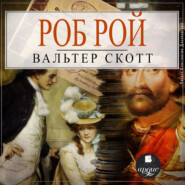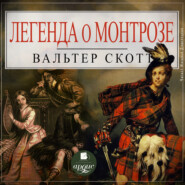По всем вопросам обращайтесь на: info@litportal.ru
(©) 2003-2024.
✖
The Heart of Mid-Lothian, Volume 2
Настройки чтения
Размер шрифта
Высота строк
Поля
Vivat Rex,
Currat Lex,
as the poet has it, in whilk of Horace's odes I know not."
Here Butler groaned, in utter impatience of the brutality and ignorance which Bartoline had contrived to amalgamate into one sentence. But Saddletree, like other prosers, was blessed with a happy obtuseness of perception concerning the unfavourable impression which he sometimes made on his auditors. He proceeded to deal forth his scraps of legal knowledge without mercy, and concluded by asking Butler, with great self-complacency, "Was it na a pity my father didna send me to Utrecht? Havena I missed the chance to turn out as clarissimus an ictus, as auld Grunwiggin himself? – Whatfor dinna ye speak, Mr. Butler? Wad I no hae been a clarissimus ictus?– Eh, man?"
"I really do not understand you, Mr. Saddletree," said Butler, thus pushed hard for an answer. His faint and exhausted tone of voice was instantly drowned in the sonorous bray of Bartoline.
"No understand me, man? Ictus is Latin for a lawyer, is it not?"
"Not that ever I heard of," answered Butler in the same dejected tone.
"The deil ye didna! – See, man, I got the word but this morning out of a memorial of Mr. Crossmyloof's – see, there it is, ictus clarissimus et perti – peritissimus– it's a' Latin, for it's printed in the Italian types."
"O, you mean juris-consultus – Ictus is an abbreviation for juris-consultus."
"Dinna tell me, man," persevered Saddletree, "there's nae abbreviates except in adjudications; and this is a' about a servitude of water-drap – that is to say, tillicidian[6 - He meant, probably, stillicidium.] (maybe ye'll say that's no Latin neither), in Mary King's Close in the High Street."
"Very likely," said poor Butler, overwhelmed by the noisy perseverance of his visitor. "Iam not able to dispute with you."
"Few folk are – few folk are, Mr. Butler, though I say it that shouldna say it," returned Bartoline with great delight. "Now, it will be twa hours yet or ye're wanted in the schule, and as ye are no weel, I'll sit wi' you to divert ye, and explain t'ye the nature of a tillicidian. Ye maun ken, the petitioner, Mrs. Crombie, a very decent woman, is a friend of mine, and I hae stude her friend in this case, and brought her wi' credit into the court, and I doubtna that in due time she will win out o't wi' credit, win she or lose she. Ye see, being an inferior tenement or laigh house, we grant ourselves to be burdened wi' the tillicide, that is, that we are obligated to receive the natural water-drap of the superior tenement, sae far as the same fa's frae the heavens, or the roof of our neighbour's house, and from thence by the gutters or eaves upon our laigh tenement. But the other night comes a Highland quean of a lass, and she flashes, God kens what, out at the eastmost window of Mrs. MacPhail's house, that's the superior tenement. I believe the auld women wad hae agreed, for Luckie MacPhail sent down the lass to tell my friend Mrs. Crombie that she had made the gardyloo out of the wrang window, out of respect for twa Highlandmen that were speaking Gaelic in the close below the right ane. But luckily for Mrs. Crombie, I just chanced to come in in time to break aff the communing, for it's a pity the point suldna be tried. We had Mrs. MacPhail into the Ten-Mark Court – The Hieland limmer of a lass wanted to swear herself free – but haud ye there, says I."
The detailed account of this important suit might have lasted until poor Butler's hour of rest was completely exhausted, had not Saddletree been interrupted by the noise of voices at the door. The woman of the house where Butler lodged, on returning with her pitcher from the well, whence she had been fetching water for the family, found our heroine Jeanie Deans standing at the door, impatient of the prolix harangue of Saddletree, yet unwilling to enter until he should have taken his leave.
The good woman abridged the period of hesitation by inquiring, "Was ye wanting the gudeman or me, lass?"
"I wanted to speak with Mr. Butler, if he's at leisure," replied Jeanie.
"Gang in by then, my woman," answered the goodwife; and opening the door of a room, she announced the additional visitor with, "Mr. Butler, here's a lass wants to speak t'ye."
The surprise of Butler was extreme, when Jeanie, who seldom stirred half-a-mile from home, entered his apartment upon this annunciation.
"Good God!" he said, starting from his chair, while alarm restored to his cheek the colour of which sickness had deprived it; "some new misfortune must have happened!"
"None, Mr. Reuben, but what you must hae heard of – but oh, ye are looking ill yoursell!" – for the "hectic of a moment" had not concealed from her affectionate eyes the ravages which lingering disease and anxiety of mind had made in her lover's person.
"No: I am well – quite well," said Butler with eagerness; "if I can do anything to assist you, Jeanie – or your father."
"Ay, to be sure," said Saddletree; "the family may be considered as limited to them twa now, just as if Effie had never been in the tailzie, puir thing. But, Jeanie lass, what brings you out to Liberton sae air in the morning, and your father lying ill in the Luckenbooths?"
"I had a message frae my father to Mr. Butler," said Jeanie with embarrassment; but instantly feeling ashamed of the fiction to which she had resorted, for her love of and veneration for truth was almost Quaker-like, she corrected herself – "That is to say, I wanted to speak with Mr. Butler about some business of my father's and puir Effie's."
"Is it law business?" said Bartoline; "because if it be, ye had better take my opinion on the subject than his."
"It is not just law business," said Jeanie, who saw considerable inconvenience might arise from letting Mr. Saddletree into the secret purpose of her journey; "but I want Mr. Butler to write a letter for me."
"Very right," said Mr. Saddletree; "and if ye'll tell me what it is about, I'll dictate to Mr. Butler as Mr. Crossmyloof does to his clerk. – Get your pen and ink in initialibus, Mr. Butler."
Jeanie looked at Butler, and wrung her hands with vexation and impatience.
"I believe, Mr. Saddletree," said Butler, who saw the necessity of getting rid of him at all events, "that Mr. Whackbairn will be somewhat affronted if you do not hear your boys called up to their lessons."
"Indeed, Mr. Butler, and that's as true; and I promised to ask a half play-day to the schule, so that the bairns might gang and see the hanging, which canna but have a pleasing effect on their young minds, seeing there is no knowing what they may come to themselves. – Odd so, I didna mind ye were here, Jeanie Deans; but ye maun use yoursell to hear the matter spoken o'. – Keep Jeanie here till I come back, Mr. Butler; I winna bide ten minutes."
And with this unwelcome assurance of an immediate return, he relieved them of the embarrassment of his presence.
"Reuben," said Jeanie, who saw the necessity of using the interval of his absence in discussing what had brought her there, "I am bound on a lang journey – I am gaun to Lunnon to ask Effie's life of the king and of the queen."
"Jeanie! you are surely not yourself," answered Butler, in the utmost surprise; – "you go to London —you address the king and queen!"
"And what for no, Reuben?" said Jeanie, with all the composed simplicity of her character; "it's but speaking to a mortal man and woman when a' is done. And their hearts maun be made o' flesh and blood like other folk's, and Effie's story wad melt them were they stane. Forby, I hae heard that they are no sic bad folk as what the Jacobites ca' them."
"Yes, Jeanie," said Butler; "but their magnificence – their retinue – the difficulty of getting audience?"
"I have thought of a' that, Reuben, and it shall not break my spirit. Nae doubt their claiths will be very grand, wi' their crowns on their heads, and their sceptres in their hands, like the great King Ahasuerus when he sate upon his royal throne fornent the gate of his house, as we are told in Scripture. But I have that within me that will keep my heart from failing, and I am amaist sure that I will be strengthened to speak the errand I came for."
"Alas! alas!" said Butler, "the kings now-a-days do not sit in the gate to administer justice, as in patriarchal times. I know as little of courts as you do, Jeanie, by experience; but by reading and report I know, that the King of Britain does everything by means of his ministers."
"And if they be upright, God-fearing ministers," said Jeanie, "it's sae muckle the better chance for Effie and me."
"But you do not even understand the most ordinary words relating to a court," said Butler; "by the ministry is meant not clergymen, but the king's official servants."
"Nae doubt," returned Jeanie, "he maun hae a great number mair, I daur to say, than the duchess has at Dalkeith, and great folk's servants are aye mair saucy than themselves. But I'll be decently put on, and I'll offer them a trifle o' siller, as if I came to see the palace. Or, if they scruple that, I'll tell them I'm come on a business of life and death, and then they will surely bring me to speech of the king and queen?"
Butler shook his head. "O Jeanie, this is entirely a wild dream. You can never see them but through some great lord's intercession, and I think it is scarce possible even then."
"Weel, but maybe I can get that too," said Jeanie, "with a little helping from you."
"From me, Jeanie! this is the wildest imagination of all."
"Ay, but it is not, Reuben. Havena I heard you say, that your grandfather (that my father never likes to hear about) did some gude langsyne to the forbear of this MacCallummore, when he was Lord of Lorn?"
"He did so," said Butler, eagerly, "and I can prove it. – I will write to the Duke of Argyle – report speaks him a good kindly man, as he is known for a brave soldier and true patriot – I will conjure him to stand between your sister and this cruel fate. There is but a poor chance of success, but we will try all means."
"We must try all means," replied Jeanie; "but writing winna do it – a letter canna look, and pray, and beg, and beseech, as the human voice can do to the human heart. A letter's like the music that the ladies have for their spinets – naething but black scores, compared to the same tune played or sung. It's word of mouth maun do it, or naething, Reuben."
"You are right," said Reuben, recollecting his firmness, "and I will hope that Heaven has suggested to your kind heart and firm courage the only possible means of saving the life of this unfortunate girl. But, Jeanie, you must not take this most perilous journey alone; I have an interest in you, and I will not agree that my Jeanie throws herself away. You must even, in the present circumstances, give me a husband's right to protect you, and I will go with you myself on this journey, and assist you to do your duty by your family."
"Alas, Reuben!" said Jeanie in her turn, "this must not be; a pardon will not gie my sister her fair fame again, or make me a bride fitting for an honest man and an usefu' minister. Wha wad mind what he said in the pu'pit, that had to wife the sister of a woman that was condemned for sic wickedness?"
"But, Jeanie," pleaded her lover, "I do not believe, and I cannot believe, that Effie has done this deed."
"Heaven bless ye for saying sae, Reuben," answered Jeanie; "but she maun bear the blame o't after all."
"But the blame, were it even justly laid on her, does not fall on you."
"Ah, Reuben, Reuben," replied the young woman, "ye ken it is a blot that spreads to kith and kin. – Ichabod – as my poor father says – the glory is departed from our house; for the poorest man's house has a glory, where there are true hands, a divine heart, and an honest fame – And the last has gane frae us a."

















